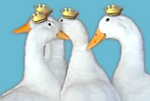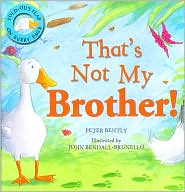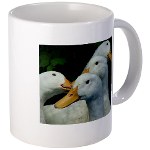Make Your Own N0-Spill Water Bowl
It is not unusual for us to be driving somewhere with a duck or goose in our car. Since waterfowl can become carsick and vomit, it is vital that they travel with a water bowl.
Pet stores often price their spill-proof water bowls at $20 or more! Here's a simple way to make your own no-spill water bowl for under a dollar!
First, purchase a disposable container that is the perfect size for your duck or goose.
Next, carefully cut a large hole in the lid, leaving only 1 inch of plastic around the border.
Finally, snap the lid onto your bowl and fill it halfway with water.
That's it!
It's dishwasher safe or disposable if it gets really messy.
Kiddie Pool Safety
Is your duck or goose's kiddie pool set up safely?
Waterfowl legs are just not built for strenuous land activities, and ducks especially can trip over the lip of a pool while climbing in and out. Serious hip, leg, foot and toe injuries can be prevented simply by digging a hole and inserting their kiddie pool into the ground.
Sink your duck's pool into the ground for safety
Sinking their pool into the ground can also eliminate the need for the staircase obstacle that many families construct out of rocks to help their ducks climb up into their kiddie pool. Again, these makeshift ladders can be very dangerous for fragile legs.
Makeshift steps are not safe for duck legs and feet
If your bird is small you can place a single stepping stone or brick inside the pool to help them get out onto land again, but be sure this stone is safe. You don't want webbed feet slipping behind a crack or getting pinched. Remember, when ducks molt, their wings are not as powerful and they do not have the lift it may require to get out of their pool. This is another good time to provide them with a stepping stone.
A Word on Coccidia
We recently had someone contact us about Coccidia in a duck they rescued and brought to the vet. The vet made some assumptions that are true of dogs, but not so true of waterfowl--especially rescued waterfowl.
Coccidia is a protozoa found in ponds, streams, lakes and other natural bodies of water all over the world. They are deposited in the feces of wild ducks and geese and since waterfowl love to dabble in water, they can easily ingest these parasites. The smaller the water source and the more wild waterfowl visiting it (and pooping in it), the higher the risk of a coccidia infection.
The presence of coccidia is confirmed by a fecal exam, but symptoms can include diarrhea, bloody diarrhea, weight loss and weakness. If you’re concerned just bring a fecal sample to your vet and specifically request that it be tested for parasites “including coccidia” to insure they actually check for it (many places won’t unless you specifically request it).
Vets who are inexperienced with waterfowl sometimes assume that for a duck or goose to get coccidia their living conditions must be the same as when dogs get it. When dogs get coccidia it’s often because they are stressed and living in filthy conditions (often in dirty kennels) where they are ingesting fecal matter. Such vets might assume that your duck or goose is being kept in similar adverse living conditions, which may incite warnings about contaminated and ruined soil. This is when it's important for you to understand (and perhaps clarify with your vet) that ducks and geese are different than canines.
First, ducks and geese who have access to water that wild waterfowl are also frequenting can be exposed to coccidia without filth being a factor.
Second, whereas dogs tend to be in "fowl" conditions in order to be ingesting fecal matter, it's part of a duck or goose's natural routine to dabble in puddles. All it takes is a little rain and grounds frequented by wild waterfowl can become dotted with puddles that embody fecal matter. Even the cleanest of ducks and geese cannot resist a good puddle and may become incidentally infected. This is why it's a good idea to do periodic fecal exams on your birds if they are at risk of exposure.
If your grounds are deeply infected with coccidia you can either turn over the soil or arrange for a safe and legal burning of the grounds to eradicate them. In barns/houses a 10% bleach/90% water solution often does the trick. Be sure to let closed structures air out completely before allowing your ducks or geese access back into them.
Ducks and geese in closed flocks who do not have access to "community" water or grounds frequented by wild waterfowl are not likely to be exposed to this parasite (unless you track something in). Also, waterfowl coccidia cannot transfer to humans or other pets. It is species specific.
Dearth / Dimeacious Earth
If you have a duck or goose with a positive fecal you should have your vet prescribe meds for quick control and to avoid its spread to other members. However, if you are looking at prevention Food Grade Dimeacious Earth or Food Grade Dearth is a good option (esp if you’re concerned about an area being contaminated with parasites).
Food Grade Dearth tends to be used on large farms and commercial settings where parasites are inevitable more so than in clean, backyard settings, but that doesn’t mean you can’t use it. It is safe and effective provided you use Food Grade Dearth. Do NOT give your birds Dearth unless it is Food Grade.
Food Grade Dearth has to be fed daily for anywhere between 7 days and 60 days to eliminate hookworms, roundworms, pinworms, tapeworms and whipworms (5% of daily feed for ducks). If fecals still show positive, the amount of Dearth may need to be increased (consult with your vet first). It doesn't seem to be fully effective against coccidia, although it may reduce numbers.
It is always a good idea to consult with your experienced waterfowl vet before beginning any dietary regime.
Another means of using Food Grade Dearth to help decrease parasite populations is to sprinkle it over the grounds of your duck pen. One of our supporters discovered this could be easily done by pouring the Dearth into a wicker basket and then shaking the basket while she walked through the pen. When parasites try to cross the Dearth it causes them serious injury and in many cases, kills them.
Backyard Poultry
We are always working to reach more families and teach more pet owners as much as we can about the proper care of domestic ducks.
We would like to thank Backyard Poultry magazine for featuring The Ultimate Pet Duck Guidebook in their Aug/Sept issue!
It's a real page turner!





